When it comes to designing a life that’s both adventurous and healthy, knowledge is power. As world travelers embracing a nomadic lifestyle, we’ve learned (Read Outlive: The Science and Art of Longevity) that maintaining peak health on the road isn’t just about exercise or diet—it’s about understanding your body at a molecular level through personalized health optimization. Regular blood testing and data-driven supplementation offer an affordable, objective way to uncover hidden imbalances before they become problems. By leveraging this approach, you can take control of your longevity and well-being, no matter where you are in the world.
In this post, I’m sharing my personal journey of tracking blood markers over 10+ years, how I’ve matched supplements to my unique biology why this approach beats guesswork and of course, how much all of this cost. If you’re curious about optimizing your health with science-backed tools while living life on your own terms, this is for you.
Disclaimer: This blog is for educational purposes only. The supplements and strategies mentioned are not intended to diagnose, treat, cure, or prevent any disease. Always consult your healthcare provider before starting any supplement or treatment plan. Additionally, some links in this post may be affiliate links, meaning we may earn a small commission if you make a purchase through these links at no extra cost to you. These commissions help support the continued creation of content and recommendations. We only recommend products I trust and believe in, based on my own personal experiences and research.
Original publish date: May 16, 2025
Last updated: May 21, 2025
Why Blood Testing Is the Ultimate Health Hack
Blood testing is the gateway to unlocking personalized health insights. Unlike vague symptoms, blood markers provide precise, objective data on your metabolic, cardiovascular, and hormonal health. By using personalized health optimization, you can identify rising issues like elevated LDL cholesterol, inflammation, insulin resistance, or hormonal imbalances before they escalate. Regular testing lets you see the impact of lifestyle and supplement changes, track your progress, and tailor your health strategy with confidence.
- Early Detection: Identify health risks early and make informed changes to your health strategy.
- Track Progress: See the real impact of lifestyle changes or supplements on your body.
- Personalized Optimization: Customize your health strategy with data, rather than relying on guesswork.
- Testing Frequency: Regular blood tests every three to six months give you dynamic snapshots of your health, empowering you to make proactive decisions for longevity.
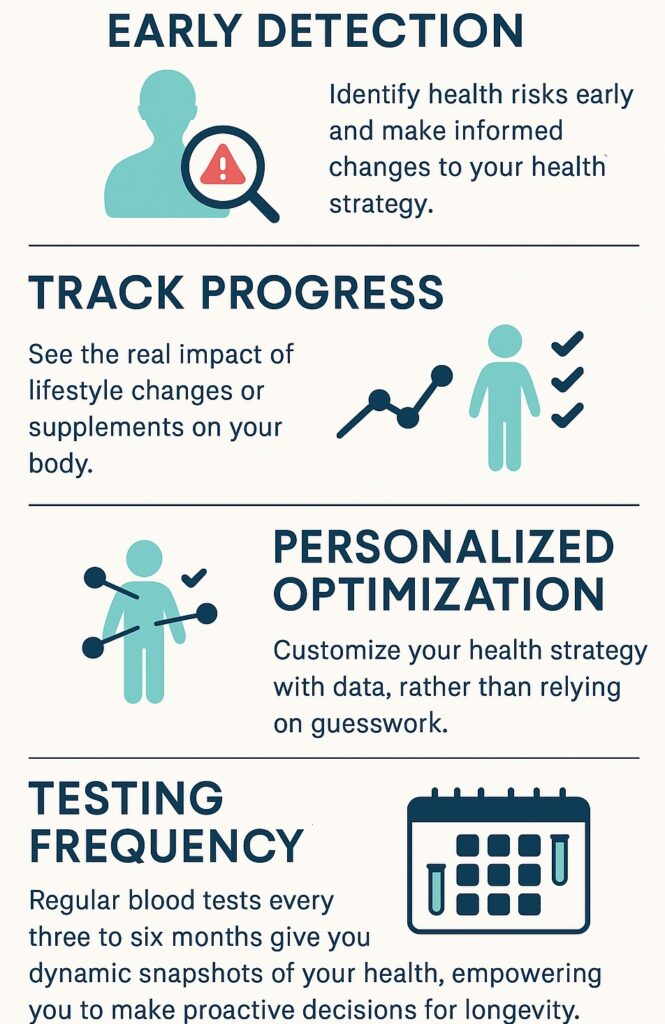
My Blood Testing Journey
Tracking blood markers across different countries and labs has been part of my nomadic lifestyle. I’ve starting ordering my own blood tests from the USA in 2016 and since becoming a full time nomad in 2028, I’ve ordered blood test in Vietnam, Taiwan, Malaysia, and Thailand, confirming that quality blood testing is accessible and affordable worldwide.
How to order blood test when overseas?
When traveling abroad, all you really need to do is find a hospital or lab and bring your list of required tests. It’s as straightforward as that. Here are the places I’ve been visiting since 2018.
- 🇻🇳 Medilab, Da Nang, Vietnam (Feb 2020, Apr 2025) — 136 Nguyen Van Linh, Da Nang City, Vietnam — Google Maps: Medilab
- 🇹🇼 Minsheng Medical Laboratory, Taipei, Taiwan (Mar 2021, Aug 2023) — No. 2, Section 1, Minsheng East Road, Taipei, Taiwan — Google Maps: Minsheng Medical Laboratory
- 🇹🇭 CM Mediclininc, Chiang Mai, Thailand (Jan 2024) — 109/16-17 Chang Phuak Road, Chiang Mai 50300, Thailand — Google Maps: CM Mediclinic
- 🇲🇾 Pathlab, Penang, Malaysia (Feb 2024) — No. 45, Jalan Burma, 10350 Penang, Malaysia — Google Maps: Pathlab
- 🇹🇼 Taipei Adventist, Taipei, Taiwan (Aug 2023, Sep 2023, Apr-Jun 2024) — 218, Section 2, Zhongshan North Road, Taipei City, Taiwan 104 — Google Maps: Taipei Adventist Hospital
In 2024, I switched to FunctionHealth, a US-based service that offers comprehensive lab testing—covering over 100 blood markers—along with personalized insights, all at an incredibly affordable price without needing insurance. FunctionHealth makes blood testing as budget-friendly as some of the cheapest labs I’ve visited in Asia! (Read: FunctionHealth Blood Tests Review: A Wellness Wake-Up Call)
This data-driven approach gives me actionable knowledge to tailor supplements and lifestyle choices no matter where I am.
Supplements: What’s Worked for Me (And Why)
Over the years, I’ve matched supplements to specific blood markers that were outside their optimal ranges. For example, low vitamin D and magnesium levels prompted targeted supplementation, while elevated LDL cholesterol and blood sugar markers led me to introduce Red Yeast Rice, CoQ10, Berberine, and cinnamon. Each supplement was chosen to address precise imbalances, supported by consistent blood testing to monitor improvements. This disciplined strategy ensures every addition delivers meaningful benefits aligned with my longevity goals.
Here’s a timeline of when I added new supplements to my stack, which ones I chose, and why I picked them.
| Period | Out-of-Range Markers (Values) | Supplements Added (with Product links) | Why These Supplements? |
|---|---|---|---|
| Sep 2021 | No test data available, but studies show Omega-3 benefit | Omega-3 (Carlson, Elite Omega-3 Gems) | Supports cardiovascular & anti-inflammatory health. Dr. Rhonda Patrick advocates for omega-3 benefits on longevity. |
| Dec 2023 | – Vitamin D: 31 ng/mL (optimal 40–60) – Magnesium RBC: 1.7 mg/dL (optimal 2.07 – 2.55 ) | – Vitamin D3 + K2 (AG1) – Magnesium stack (NOW Magnesium Citrate + SlowMag Magnesium Chloride + Jarrow Magnesium L-Threonate) | Supports bone, immune, muscle & cardiovascular health. |
| Mar 2024 | Vitamin B-12: 349 ng/mL (optimal 500 – 1500) | – Glycine (Thorne Glycine) – B-Complex (Jarrow Methyl B-12 & Folate) | Supports methylation, detoxification, and inflammation reduction. |
| Summer 2024 | Stable markers but wanted to improve athletic recovery | Creatine (California Gold Nutrition) | Enhances muscular and cognitive energy. |
| Nov 2024 | – Total Cholesterol: 205 mg/dL (optimal 100 – 180) – LDL: 120 mg/dL (optimal 50 – 70) – HbA1c 5.9% (optimal 4.5 – 5.5) | – Red Yeast Rice (Throne Red Yeast Rice) – Berberine (Nutricost Berberine HCl ) | Targets cholesterol and glucose metabolism. |
| Mar 2025 | Working to improve athletic performance | Ashwagandha (Jarrow Ashwagandha) | Supports normalized resistance to physical/mental stress and supports endurance, muscle recovery, and cognitive health |
| May 2025 | Vitamin D: 50 ng/mL (optimal 40–60) | – Vitamin D3 + K2 (higher dose of AG1) – Selenium (Thorne Selenium) – Zinc (Thorne Zinc), – Curcumin (Doctor’s Best High Absorption Curcumin) | Support bone, heart, and immune health; optimize thyroid function and provide antioxidant benefits; boosts immunity, skin health, and cognition; reduces inflammation, supports brain function, and promotes heart and joint health. |
Here are graphs showing my blood test results since 2016 for the key markers we discussed. Each chart includes the optimal range I’m aiming for and highlights the date I began supplementation to improve that specific marker.
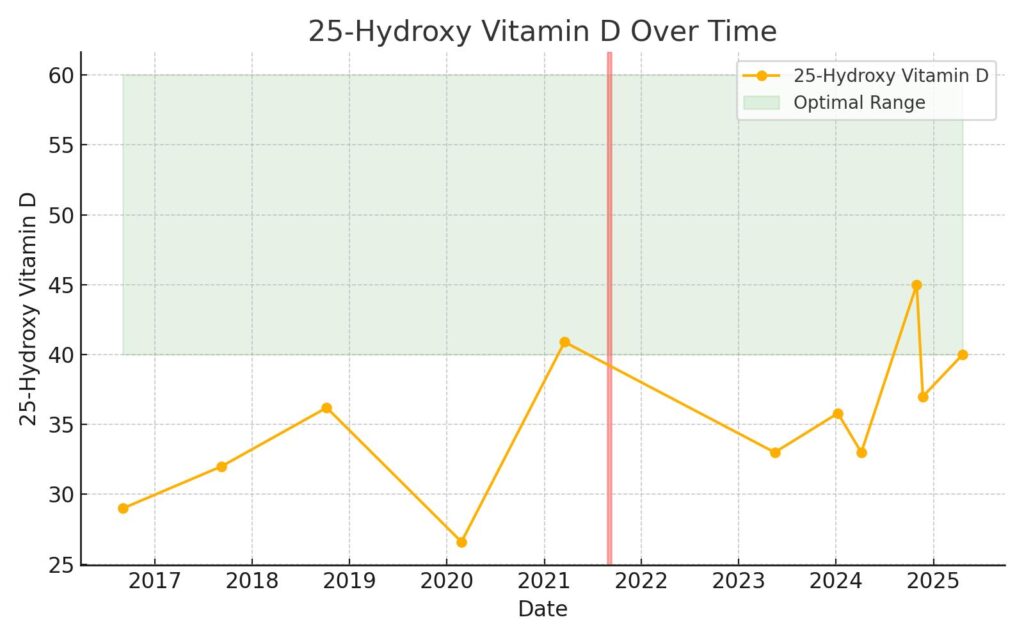
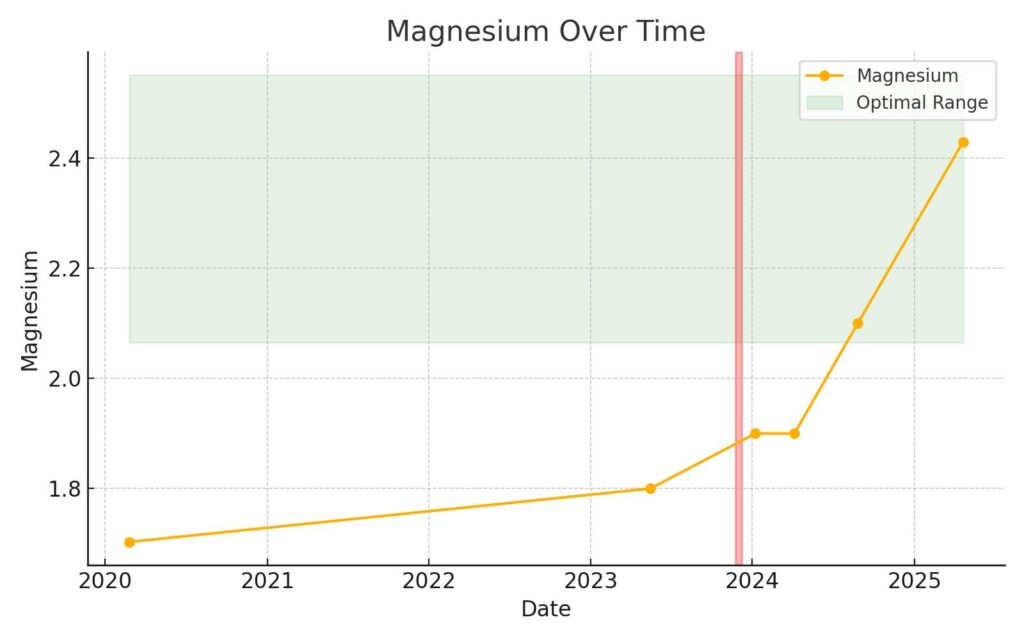
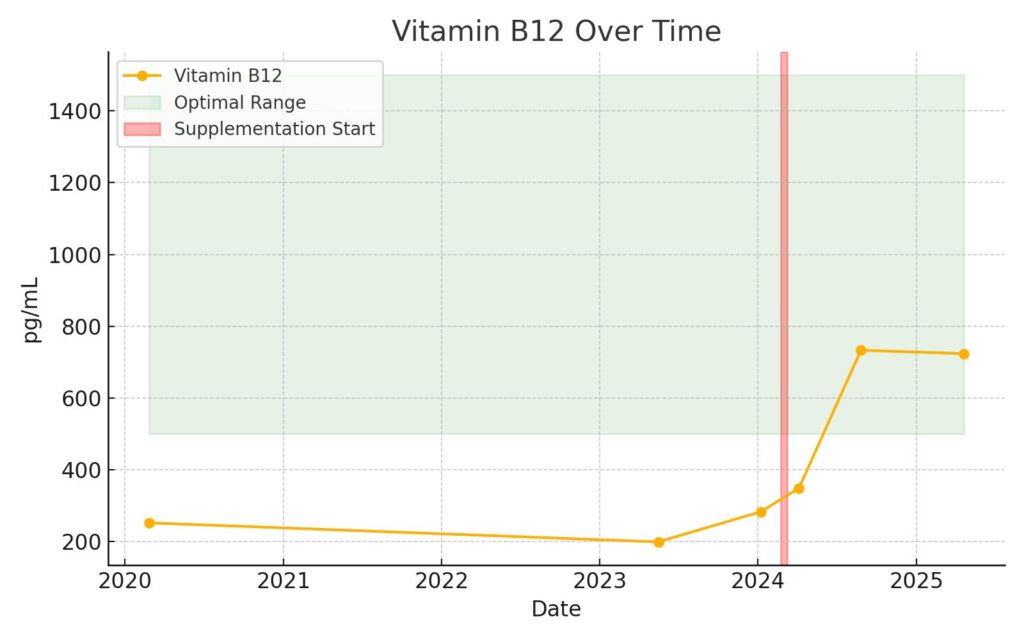
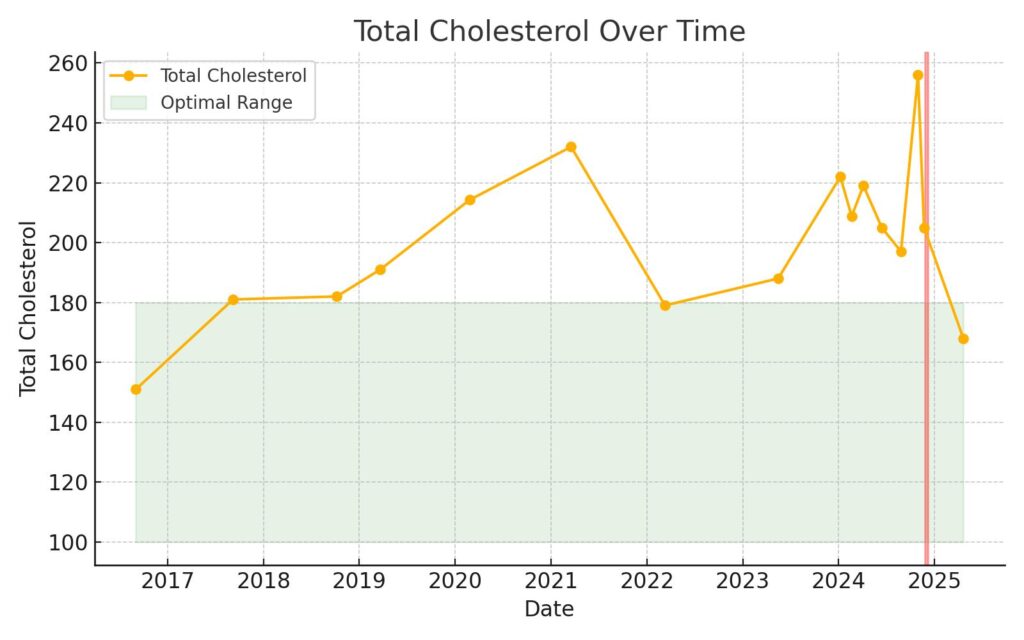
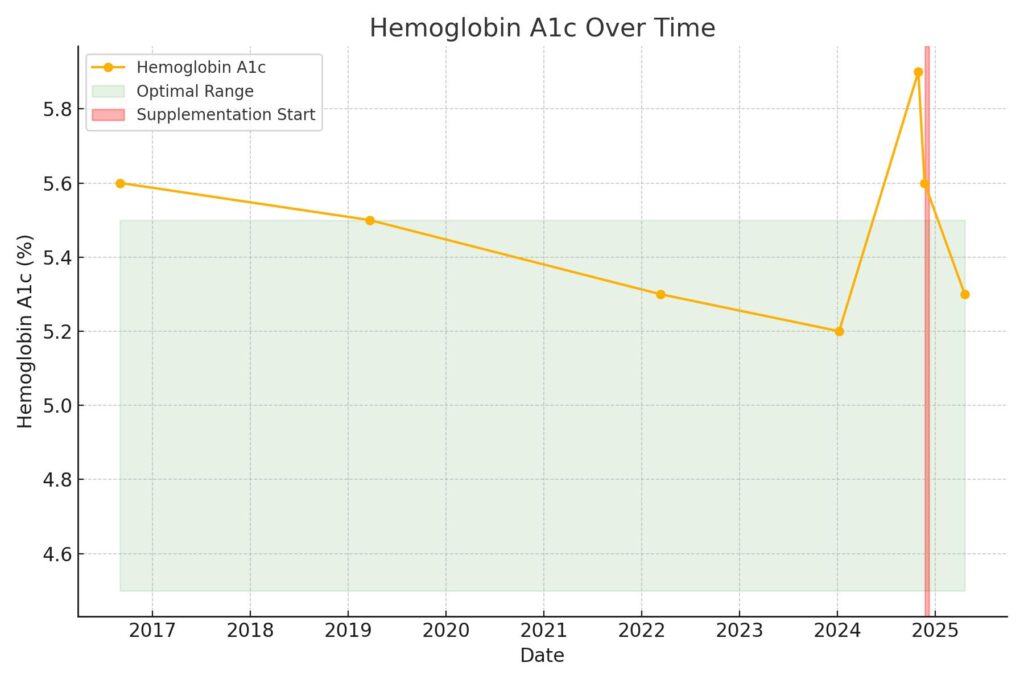
How Each Supplement Fits Into My Longevity Plan
Each supplement in my stack serves a clear purpose based on scientific evidence. Omega-3 fatty acids reduce inflammation and support heart and brain health, vitamin D3 and K2 optimize bone and cardiovascular function, and magnesium enhances muscle, nerve, and cognitive performance. Adaptogens like Ashwagandha help balance stress hormones, while compounds like Berberine and Curcumin improve glucose control and reduce inflammation. Proper timing and dosing maximize absorption and efficacy, making supplementation an integral part of my health optimization.
Here are the list of supplements and dosage I’ve either introduced, removed or updated in my regimen starting in 2021.
September 2021
- [Added] Omega-3: 2000 mg daily: 1250 mg EPA + 500 mg DHA (lunch)
Dr. Rhonda Patrick emphasizes omega-3’s powerful anti-inflammatory effects and cardiovascular benefits essential for longevity.
Dr. Rhonda Patrick on Omega-3
December 2023
- [Added] Vitamin D3 + K2: 1000 IU or 25 mcg D3 + 100 mcg K2 (morning)
Vitamin D is crucial for bone health, immunity, and cardiovascular function; K2 ensures proper calcium metabolism.
Dr. Rhonda Patrick on Vitamin D - [Added] Magnesium Stack: 400 mg citrate at lunch, SlowMag blend at lunch, 2 g L-Threonate ( morning & dinner)
Magnesium supports over 300 enzyme systems, crucial for muscle relaxation, nerve transmission, and cognitive function.
Andrew Huberman on Magnesium L-Theronate
Dr. Rhonda Patrick on Magnesium
March 2024
- [Added] Glycine: 1g split for dinner and 1g at bedtime
- [Added] B-Complex: Vitamin B6, Folate + Vitamin B12 (lunch)
Supports methylation cycles, reduces homocysteine, and enhances detoxification pathways.
June 2024
- [Added] Creatine: 3g, five times per week (any time)
Enhances muscular strength and cognitive performance, especially with aging.
Dr Rhonda Patrick on Creatine
November 2024
- [Updated] Vitamin D3 + K2: Increased to 5000 IU (125 mcg) D3 + 500 mcg K2 (morning)
- [Added] Red Yeast Rice + CoQ10: 600 mg + 15 mg (dinner)
- [Added] Berberine + Cinnamon: 1200 mg + 100 mg (dinner)
Red Yeast Rice lowers LDL cholesterol; CoQ10 supports mitochondria. Berberine and cinnamon improve insulin sensitivity.
March 2025
- [Added] Ashwagandha: 300 mg (bedtime)
An adaptogen that reduces stress and balances cortisol, supporting hormone health.
May 2025
- [Updated] Vitamin D3 + K2: 8000 IU (200 mcg) D3 + 800 mcg K2 (morning)
- [Updated] MagMind: 2 g L-Threonate (1g morning, 2g bedtime)
- [Added] Iodine + Selenium: 150 mcg + 100 mcg (morning)
- [Updated] B-Complex: Typical B6, Folate, B12 (lunch – every other day)
- [Added] Zinc: 20 mg + 54 mcg (lunch)
Dr. Rhonda Patrick on Zinc - [Added] Curcumin: 500–1000 mg (dinner)
Anti-inflammatory effects of oral supplementation with curcumin
Profiling Inflammatory Biomarkers following Curcumin Supplementation
Current Supplement Stack (May 2025)
My current supplement stack is the result of years of data-driven refinement, designed to support every aspect of my health and longevity goals. Starting my day with a potent dose of Vitamin D3 and K2 helps optimize bone density and cardiovascular function, while magnesium L-threonate—taken twice daily—boosts cognitive clarity and promotes restful sleep. I carefully time omega-3s, zinc, iodine, and selenium to reinforce heart health, immune resilience, and thyroid function. In the evenings, targeted supplements like Red Yeast Rice with CoQ10, Berberine combined with cinnamon, curcumin, glycine, and ashwagandha help manage cholesterol, blood sugar, inflammation, and stress hormones.
This personalized regimen is continually adjusted based on regular blood testing, ensuring each supplement plays a precise, supportive role in my overall wellness.
Morning (Fasting)
- Vitamin D3 + K2 (AG1 Vitamin D3+K2-M4/M7 Drops | Trace Ionic D3+K2-M7 Drops)
Dosage: 8000 IU Vitamin D3 + 800 mcg K2
Take with food - MagMind (Jarrow Magnesium L-Threonate)
Dosage: 1 g (first serving)
Take without food - Iodine + Selenium (Thorne Selenium)
Dosage: 150 mcg Iodine + 100 mcg Selenium
Take without food - Creatine (California Gold Nutrition)
Dosage: 5g
Take without food
Lunch
- Omega-3 (Carlson, Wild Norwegian, Elite Omega-3 Gems)
Dosage: 2000 mg total omega-3 (1250 mg EPA + 500 mg DHA)
Take with food (fat) - Magnesium Citrate (NOW Magnesium Citrate)
Dosage: 400 mg elemental magnesium
Take with food - SlowMag Muscle + Heart (SlowMag Magnesium Chloride)
Dosage: 143 mg Mg + 238 mg Ca + 416 mg Cl
Take with food - B-Complex (Jarrow Methyl B-12 & Folate)
Dosage: B6 1.5 mg, Folate 680 mcg, B12 1000 mcg (every other day)
Take with food - Zinc (Thorne Zinc)
Dosage: 20 mg Zinc
Take with food
Dinner
- Red Yeast Rice + CoQ10 (Thorne Red Yeast Rice + CoQ10)
Dosage: 600 mg Red Yeast Rice + 15 mg CoQ10
Take with food - Berberine + Cinnamon (Nutricost Berberine HCl w/ Cinnamon | Thorne Berberine)
Dosage: 1200 mg Berberine + 100 mg Cinnamon
Take with food - Curcumin (Doctor’s Best High Absorption Curcumin)
Dosage: 500–1000 mg
Take with food (fat) - Glycine (Thorne Glycine)
Dosage: 1 g (first serving)
Take with food
Bedtime
- MagMind (Jarrow Magnesium L-Threonate)
Dosage: 1 g (second serving)
Take without food - Glycine (Thorne Glycine)
Dosage: 1 g (second serving)
Take without food - Ashwagandha (Jarrow Ashwagandha)
Dosage: 300 mg
Take without food
The Power of Data-Driven Supplementation
Supplementing without knowing your body’s needs is inefficient and costly. Blood test-guided supplementation targets deficiencies and imbalances precisely, avoiding guesswork and unnecessary intake. This approach supports cardiovascular, metabolic, cognitive, and hormonal systems more effectively, reduces side effects, and tracks progress objectively. By continually adjusting based on data, you create a personalized blueprint for longevity rather than relying on generic advice.
Random supplementation wastes money and risks imbalance.
Tracking Supplements Costs Over Time
Investing in your health means tracking not just what you take but also how much you spend. Over the years, my supplement regimen has evolved, and so has the budget allocated to support my longevity goals.
Here’s a detailed breakdown of my supplement purchases over several key periods, showing how my spending aligns with my personalized health strategy.
| Purchase Date | Product Name | Bottles Ordered | Total Cost | Cost per Day |
|---|---|---|---|---|
| Nov 2023 | Carlson – Super Omega-3 Gems, 1200 mg Omega-3 | 1 | $83.30 | $1.28 |
| Mar 2024 | Carlson Super DHA Gems – 500 mg DHA Supplement | 1 | $76.50 | $0.32 |
| Carlson Maximum Omega 2000 | 1 | $112.96 | $0.94 | |
| SlowMag Muscle + Heart Magnesium Chloride with Vitamin D3 & K2 | 6 | $107.28 | $0.30 | |
| Jarrow Formulas Extra Strength Methyl Folate 400 mcg | 3 | $26.97 | $0.15 | |
| Dec 2024 | NOW Magnesium Citrate | 1 | $18.94 | $0.24 |
| Jarrow Formulas Vegan Methyl B-12 & Methyl Folate, Extra Strength, Lemon | 1 | $16.10 | $0.16 | |
| Nutriflair Premium Berberine HCL 1200mg + Pure True Ceylon Cinnamon | 1 | $26.99 | $0.45 | |
| Feb 2025 | Carlson Maximum Omega 2000 | 1 | $77.72 | $0.43 |
| NOW Magnesium Citrate | 1 | $26.25 | $0.11 | |
| Jarrow Formulas Vegan Methyl B-12 & Methyl Folate, Extra Strength, Lemon | 1 | $21.71 | $0.36 | |
| Jarrow Formulas Vegan MagMind – Magnesium L-Threonate | 1 | $36.02 | $0.40 | |
| Thorne Glycine | 1 | $30.97 | $0.12 | |
| Jarrow Formulas Ashwagandha, 300 mg, 120 Veggie Capsules | 1 | $22.62 | $0.19 | |
| May 2025 | Nutripure Omega 3 3000mg | 1 | $76.75 | $0.28 |
| NUTRI & CO Zinc Bisglycinate Breveté TRAACS® + Selenium | 1 | $13.21 | $0.44 | |
| Thorne Red Yeast Rice + CoQ10 | 1 | $37.84 | $0.32 | |
| Nutrimea Levure de Riz Rouge – Dosée en Monacoline K | 1 | $27.74 | $0.31 | |
| Nutrimea Coenzyme Q10 – 120 Gélules Vegan | 1 | $32.18 | $0.27 | |
| Bandini Berbérine 1000 mg – 180 gélules | 1 | $27.64 | $0.31 | |
| Intelligent Labs Meriva Phytosome de Curcumine 250 MG | 1 | $33.29 | $0.56 | |
| Jarrow Formulas Vegan MagMind – Magnesium L-Threonate | 3 | $109.86 | $0.41 | |
| Jarrow Formulas Ashwagandha, 300 mg, 120 Veggie Capsules | 1 | $20.46 | $0.17 |
Which per year translate to the following cost
| Year | Total Spending |
|---|
| 2024 | $385.74 |
| 2025 | $594.26 |
Your Longevity Plan: Test, Optimize, Repeat
Longevity is a journey that requires regular feedback. Testing your blood every six months lets you see how your interventions are working and where adjustments are needed.
If you are living (or stopping by the USA), I highly recommend using innovative services like FunctionHealth (Read our review: FunctionHealth Blood Tests Review: A Wellness Wake-Up Call) as they makes this process simple, affordable, and insightful. FunctionHealth helped me customized my testing with personalized dietary, supplements & lifestyle recommendation unique to my biology to maximize my health-span and my vitality.
For example, after noticing my LDL levels were high in November 2024, I added Red Yeast Rice and CoQ10 (Thorne Red Yeast Rice + CoQ10) alongside with Berberine (Nutricost Berberine HCl w/ Cinnamon) to my regimen. Six months later (April 2025), I re-tested and saw a significant improvement and I was able to get back in the optimal range I would like to target as you can clearly see on the graphs below


This cycle of testing, optimizing, and repeating isn’t just theoretical, this is how I ensure my health strategy is continuously evolving and aligned with my goals.
Getting Started with Blood Testing: A Quick Guide for First-Timers
Not sure where to begin? Here’s a simple step-by-step to get your blood tests done the right way—whether you’re in the USA or traveling overseas.
If you’re in the USA
Don’t overthink it! The easiest and most comprehensive option is to sign up with FunctionHealth. They offer a wide range of lab panels tailored to your health goals and provide personalized reports that make sense of your data. No insurance needed, no confusing paperwork — just straightforward testing and clear insights.
If you’re outside of the USA
When you’re outside the USA, you’ll typically need to order your blood tests individually or as panels at local hospitals or labs. One single test rarely tells the full story; it’s important to order panels that allow you to cross-reference key markers. For example:
- Checking fasting glucose alone is less informative without HbA1c or insulin to assess metabolic health.
- Measuring cholesterol is best done alongside HDL, LDL, and triglycerides to fully understand cardiovascular risk.
Recommended Starter Panels for First-Timers
1. Metabolic Health Panel
Focus: Blood sugar and cardiovascular risk
Tests include:
- Fasting glucose (optimal: 70–90 mg/dL)
- HbA1c (optimal: 4.5–5.5%)
- Lipid profile: total cholesterol (100–180 mg/dL), LDL (50–70 mg/dL), HDL (60–100 mg/dL), triglycerides (<100 mg/dL)
- Insulin
2. Inflammation & Liver Panel
Focus: Detect chronic inflammation and liver health
Tests include:
- CRP (<1 mg/L optimal)
- Liver enzymes (ALT, AST, low to mid normal optimal)
- Ferritin (30–150 ng/mL optimal)
3. Thyroid Panel
Focus: Metabolic and hormonal regulation
Tests include:
- TSH (0.5–2.0 mIU/L optimal)
- Free T3 & Free T4 (mid-range optimal)
4. Micronutrient Panel
Focus: Key vitamins and minerals
Tests include:
- Vitamin D (40–60 ng/mL optimal)
- Vitamin B12 (500–1500 pg/mL optimal)
- Magnesium (2.07–2.55 mg/dL optimal)
- Iron studies
5. Hormone Panel
Focus: Hormonal balance and stress response
Tests include:
- Testosterone
- SHBG (25–50 nmol/L optimal)
- Cortisol
6. Cancer Screening Panel
Focus: Early detection of common cancers
Tests include:
- Alpha-fetoprotein (AFP)
- PSA (men)
- CA-125 (women)
- CEA, CA 19-9
Note: The Galleri test is an advanced multi-cancer early detection blood test offered by GRAIL and accessible through services like FunctionHealth. It uses cutting-edge genomic technology to detect signals from more than 50 types of cancers across the body, often before symptoms appear. Well worth the $899 add-on fee in our opinion if you sign-up for FunctionHealth.
7. Minerals & Electrolytes Panel
Focus: Vital minerals and hydration
Tests include:
- Sodium (138–142 mmol/L optimal)
- Potassium (4.0–4.8 mmol/L optimal)
- Calcium (8.8–9.8 mg/dL optimal)
- Chloride, phosphate
8. Complete Blood Count (CBC)
Focus: Immune system and overall health
Tests include:
- White blood cells (neutrophils, lymphocytes, monocytes, eosinophils, basophils)
- Red blood cells, hemoglobin, hematocrit
- Platelet count
Understanding Optimal vs. Recommended Ranges
Lab reference ranges show where 95% of the general population falls but include people with undiagnosed conditions and are meant to detect illness – not optimize health. They can be broad and may not suit longevity goals.
Optimal ranges, like those from Peter Attia (Read Outlive: The Science and Art of Longevity), are narrower and focus on levels linked to better long-term health and disease prevention. They’re based on research and help guide personalized care. Using optimal ranges lets you catch early imbalances, track progress more accurately, and tailor your health strategy beyond just “normal” lab results.
Getting the most of your blood draw
Proper preparation is key for reliable results. Here are our essential tips:
- Fast for 8–12 hours before your test—water only. This is crucial for most blood panels, especially lipid tests.
- Drink at least 500 ml (16 oz) of water in the 1–2 hours before your appointment to stay hydrated and improve blood flow. Also, confirm if a urine sample is required and be ready to provide one!
- Schedule your blood draw in the morning and try to test at the same time on each visit. Many hormones (like cortisol and testosterone) follow daily rhythms, so consistent timing helps produce comparable results over time.
- Avoid intense exercise for 24 hours before testing, as it can temporarily alter some markers such as creatine kinase, glucose, and cortisol.
- Avoid eating fish before fasting tests, especially lipid panels, because fatty fish can raise triglycerides and cholesterol temporarily.
- Consult your healthcare provider about any medications or supplements you’re taking, since some (like biotin) can interfere with test results.
- Stay relaxed and well rested to minimize stress-induced changes in your blood.
IMPORTANT: Always check with your lab or healthcare provider for any additional instructions.
What about you? What markers do you track? Which supplements have made a difference in your health? Share your thoughts on the comments section below and I’ll be happy to answer any questions to help you optimize your health based on your own data!
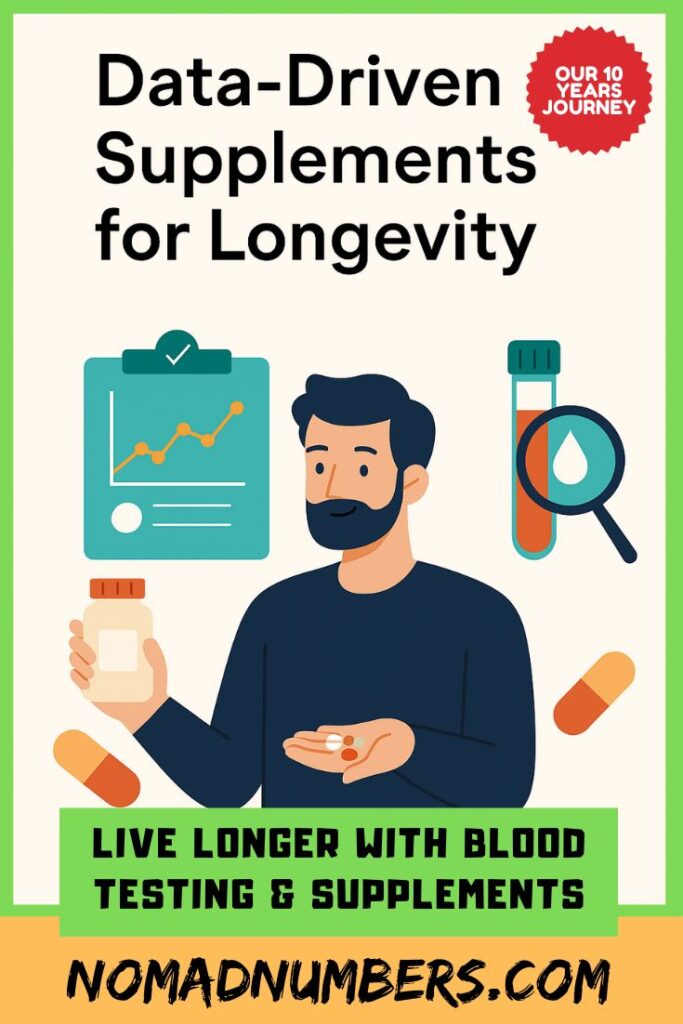



0 Comments